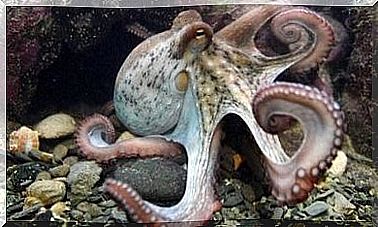INFJ Personality: The Most Peculiar According To Jung

The INFJ personality, characterized by psychological dimensions of introversion, intuition, sensitivity and judgment, according to Carl Jung represents 1% of the population. It defines an idealistic profile, serene, firm in its values, highly sensitive, but self-confident and always oriented towards improving the lives of others.
Anyone who has never heard of this type of personality will soon be able to find a book, a documentary or an article that lists the classic 10 key characteristics that define this very particular profile. The INFJ personality is all the rage in the Anglo-Saxon world, and although at first glance it can remind very sensitive people, it must be said that they are not exactly the same.
To understand a little better, let’s take a trip to its origins. The INFJ personality is actually part of the Myers-Briggs indicator, a personality test designed to identify personal preferences. This test is based on the psychological types developed by Carl Jung, who defined them in the course of his clinical experience.
Today this indicator is mainly used in group dynamics and personal growth tests. However, it should be noted that within the more academic setting and in the more rigorous psychological literature, it is not given much validity. In any case, Carl Jung’s works on psychological types are always of interest, and we are currently witnessing the forceful re-emergence of many of his approaches, and especially of his contribution to the study of personality.
In all this set of psychological profiles offered by the Myers-Briggs indicator, what is considered the most particular and unique personality of all, the INFJ, always attracts attention. Let’s try to learn more about it.

The INFJ personality or “supporter” profile
The Myers-Briggs indicator is a psychological test that is highly regarded by teachers. Help students get to know each other better, make better decisions about their academic and professional future. Through its four scales, we can know, for example, how we see the world, how we treat what surrounds us or how we relate to it.
It is also interesting to note that this indicator is based on 8 extroverted personality types and 8 introverted personality types, among which the INFJ is the most unusual as it is found in just over 1% of the population. Let’s see its characteristics.
Propensity to help others
The INFJ personality is also known as the supporter profile for the following reasons:
- They are idealists and have a high sense of right and wrong.
- They are guided by their values and always orient themselves a lot according to their beliefs.
- One of their clearest goals is to provide help to others.
- It is not limited to “saving”, as the INFJ personality has the ability to inspire, to make others better, to advance them, to make them become a person who does not need to be saved.
They know how to relate, but they appreciate loneliness
People with the INFJ personality have a particular ability to build relationships. They know how to make friends and keep them, they are close, welcoming, kind, simple and good conversationalists. Seen from the outside they can give the impression of being the classic extroverted people, however the INFJ personality controls very well the moments of sociality and delimits them over time for a very simple reason.
His nature is introverted and he needs moments of solitude to recover “energy”.

They are active dreamers
INFJ personalities are tireless dreamers. However, their dreams do not remain in illusion, as with the classic passive dreamer where idealism is so fragile and light that the wind carries it with it. In reverse. This personality has a natural need to make its contribution to society and, therefore, daydreams and acts the same way: with conviction and determination.
In a work environment these people always show independence, clear focus on goals, high creativity and a lot of intuition. It is also common that they appreciate art and science equally.
Their enthusiasm and idealism often exhaust them
The INFJ personality has only one problem: society. In this world full of inequalities, of closed doors and walls to cross, it is easy to get discouraged with so many obstacles. For this profile it is common to feel disappointment, suffering and always be physically and emotionally tired.
It is not easy for individuals with an INFJ personality to face daily criticism, stress and the clash between idealism and harsh reality. In addition, another fact that characterizes them is that they often forget to take care of themselves.

Given the main characteristics of this type of personality defined by Carl Gustav Jung, it can be understood that he is one of the figures whose thought and echo have caused a small revolution. This 1% of the population is actually the light of our society: people with clear ideals, dreamers with a purpose, eager to give the best to others.
If you feel fully identified with the INFJ personality, there is only one suggestion to add: one must persist without neglecting one’s ideals. Never give up, because sometimes this 1% of the population is enough to inspire the remaining 99%.









